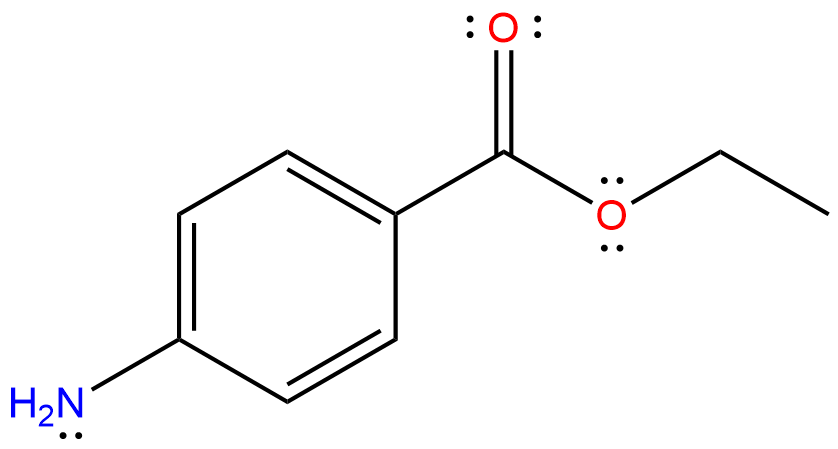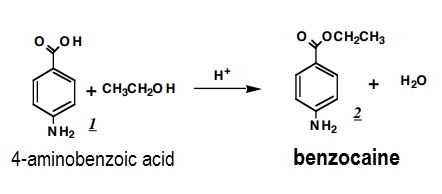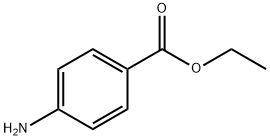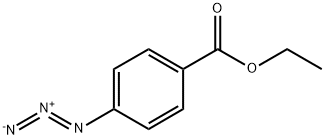Benzocaine
- CAS No.
- 94-09-7
- Chemical Name:
- Benzocaine
- Synonyms
- ETHYL 4-AMINOBENZOATE;Benzocaine base;ethyl aminobenzoate;4-AMINOBENZOIC ACID ETHYL ESTER;Anestezin;Benzocaine, USP, EP;ETHYL P-AMINOBENZOATE;NSC 4688;anesthesin;benzociane
- CBNumber:
- CB1217951
- Molecular Formula:
- C9H11NO2
Lewis structure

- Molecular Weight:
- 165.19
- MDL Number:
- MFCD00007892
- MOL File:
- 94-09-7.mol
- MSDS File:
- SDS
| Melting point | 88-90 °C |
|---|---|
| Boiling point | 172 °C (12.7517 mmHg) |
| Density | 1.17 |
| refractive index | 1.5600 (estimate) |
| Flash point | 172°C/13mm |
| storage temp. | 2-8°C |
| solubility | alcohol: soluble1 gm in 5 ml |
| form | Crystalline Powder |
| pka | 2.5(at 25℃) |
| color | White |
| Odor | odorless |
| Water Solubility | Soluble in ethanol, chloroform, ethyl ether and dilute acids. Sparingly soluble in water |
| Merck | 14,1086 |
| BRN | 638434 |
| Stability | Stable. Combustible. Incompatible with strong oxidizing agents. |
| InChIKey | BLFLLBZGZJTVJG-UHFFFAOYSA-N |
| LogP | 1.860 |
| CAS DataBase Reference | 94-09-7(CAS DataBase Reference) |
| FDA 21 CFR | 310.545 |
| EWG's Food Scores | 1-4 |
| FDA UNII | U3RSY48JW5 |
| ATC code | C05AD03,D04AB04,N01BA05,R02AD01 |
| NIST Chemistry Reference | Benzoic acid, 4-amino-, ethyl ester(94-09-7) |
| EPA Substance Registry System | Benzocaine (94-09-7) |
| UNSPSC Code | 51271900 |
| NACRES | NA.25 |
SAFETY
Risk and Safety Statements
| Symbol(GHS) |  GHS07 |
|||||||||
|---|---|---|---|---|---|---|---|---|---|---|
| Signal word | Warning | |||||||||
| Hazard statements | H317 | |||||||||
| Precautionary statements | P261-P272-P280-P302+P352-P333+P313-P362+P364 | |||||||||
| Hazard Codes | Xi,T,F | |||||||||
| Risk Statements | 43-36/37/38-39/23/24/25-23/24/25-11 | |||||||||
| Safety Statements | 22-24/25-37/39-26-24-45-36/37-16-7 | |||||||||
| RIDADR | 3077 | |||||||||
| WGK Germany | 2 | |||||||||
| RTECS | DG2450000 | |||||||||
| TSCA | Yes | |||||||||
| HazardClass | 9 | |||||||||
| PackingGroup | III | |||||||||
| HS Code | 29224995 | |||||||||
| Hazardous Substances Data | 94-09-7(Hazardous Substances Data) | |||||||||
| Toxicity | LD50 oral in rat: 3042mg/kg | |||||||||
| NFPA 704 |
|
Benzocaine Chemical Properties,Uses,Production
Indications and Usage
Benzocaine is a colorless trapezial crystal. Its melting point is 92℃ (88-90℃), boiling point is 183-184°C (1.87kPa). 1g of this drug is soluble in about 2500ml water, 5ml ethanol, 2ml chloroform, 4ml ether or 30-50ml almond oil and olive oil, and it is also soluble in dilute acid. It is stable in air, odorless, and slightly bitter.
Benzocaine is a lipid-soluble surface anesthetic, and it weaker than other local anesthetics such as lidocaine and tetracaine, so it will not cause any discomfort due to its anesthetizing effects when acting on mucosa. Benzocaine is a type of drug with relatively strong lipid-solubility and will bind with mucosa and the fatty layer of skin, but it will not easily penetrate into the body and cause poisoning. Benzocaine can be used as a precursor for Ossur imitation, orthocaine, and procaine. It is also used as a local anesthetic and can stop pain and itching. It is mainly used in pain and itch prevention on wounds, ulcer surfaces, mucous membrane surfaces and hemorrhoids. Its paste form can also lubricate and stop pain for the nasopharynx and endoscope. Benzocaine’s aural solution is used to alleviate acute congestion, concentrated otitis externa, and the pain and itching of swimming otitis. Benzocaine is also effective for toothaches, sore throat, oral ulcers, all kinds of hemorrhoids, anal fissures, and vulvar itching. Benzocaine can be used as a male sex organ numbing agent to slow ejaculation. It can also be used as a numbing lubricant for the pharynx and endoscope, and it can be used as a UV absorbing agent for cosmetics.
Uses
- Benzocaine is a local anaesthetic of the ester type with a poor solubility in water. The drug benzocaine is normally used as a topical pain reliever or as a common ingredient in cough drops. Benzocaine is used in multiple forms including lotion, gel, liquid, lozenges, and sprays. When Benzocaine is applied in any form it temporarily numbs or blocks the nerve endings, which leads to a decreases in the amount of pain. It is used in cattle, sheep, swine and horses for local and prolonged low epidural anaesthesia. Standard therapeutic doses of benzocaine ranged from 150 to 750 mg per animal. Benzocaine is also currently used as surface anaesthetic as ointments (0.5% benzocaine) for wounds and ulcerated surfaces in horses, cattle and sheep applied twice a day until healing.
- A commonly used topical pain reliever. Main active ingredient in anesthetic ointments.
- Anesthetic;Na+ channel blocker
- Benzocaine acts on the central nervous system, cardiovascular system, neuromuscular junctions and ganglion synapse. Its mechanism of action is to prevent the generation and conduction of the nerve impulse. Local anaesthetics block conduction by decreasing or preventing the large transient increase in the permeability of excitable membranes to Na+ that is produced by a slight depolarisation. This action of local anaesthetics is due to their direct interaction with voltage-sensitive Na+ channels. Benzocaine is mainly hydroxylated in the metabolite para-aminobenzoic acid (PABA) that inhibits the action of sulphonamides.
- Benzocaine is distributed in the body, crosses the placenta and is metabolised in the liver and in the plasma by non-specific cholinesterases. Benzocaine and its main metabolite (para-aminobenzoic acid) are excreted into urine.
- Benzocaine appears as a moderately toxic compound after single administration. The acute intraperitoneal LD50 value was 216 mg/kg bw in mice. Benzocaine may induce methemoglobinemia in several species such as sheep, cats and dogs.
synthesis
Benzocaine is produced by reduction of ethyl 4-nitrobenzoate with iron or by the acid-catalyzed esterification of 4-aminobenzoic acid with ethanol:
In a 5-mL round bottom flask, add 120 mg of 4-aminobenzoic acid (often called PABA for paminobenzoic acid), 1.5 mL of absolute ethanol (absolute ethanol is completely free of water and can be found on the hooded shevles), and 3 boiling chips. Heat this mixture on a sand bath until all the solid dissolves. Cool in ice and then add 0.25 mL of concentrated sulfuric acid dropwise. (One drop at a time.) A large amount of precipitate will form when the sulfuric acid is added, but this will dissolve during the reflux that follows. Attach an air condenser from the microscale kit, and reflux gently for 60- 75 min. Check periodically to be sure that the mixture is refluxing gently, and that the ring of condensation of solvent lies somewhere along the inner surface of the air condenser; loss of solvent will cause overheating and a significant decrease in yield.
Description
Benzocaine (ethyl p-aminobenzoate) is used topically by itself or in combination with menthol or
phenol in nonprescription dosage forms such as gels, creams, ointments, lotions, aerosols, and
lozenges to relieve pain or irritation caused by such conditions as sunburn, insect bites,
toothache, teething, cold sores or canker sores in or around the mouth, and fever blisters.
Benzocaine is a lipophilic local anesthetic agent with a short duration of action.
Like most amino ester-type local anesthetics, it is easily hydrolyzed by plasma cholinesterase.
Because of its low pKa, however, it is un-ionized under most physiological conditions and, therefore, can only bind
to the lipid side of the local anesthetic receptor. It also can easily cross membranes
into systemic circulation to cause systemic toxicities. Furthermore, being a PABA derivative, it
has similar allergenic properties to procaine and is contraindicated with sulfonamide antibacterial
agents.
Chemical Properties
Benzocaine is a white odourless needle-like crystal, slightly soluble in water and easily soluble in organic solvents. For example: ethanol, chloroform, ether, soluble in almond oil, olive oil.
Uses
Benzocaine is used as an anesthetic (Local and topical) that in products such as burn and sunburn remedies, hemorrhoidal creams, suppositories, creams for treatment of poison ivy, oral and gingival products, sore-throat sprays/lozenges, astringents, appetite suppressants, callus and wart remedies, athlete's-foot remedies, toothache- and denture-irritation products.
Definition
ChEBI: Benzocaine is a benzoate ester having 4-aminobenzoic acid as the acid component and ethanol as the alcohol component. A surface anaesthetic, it is used to suppress the gag reflex, and as a lubricant and topical anaesthetic on the larynx, mouth, nasal cavity, respiratory tract, oesophagus, rectum, urinary tract, and vagina. It has a role as a topical anaesthetic, an antipruritic drug, an allergen and a sensitiser. It is a benzoate ester and a substituted aniline.
brand name
Americaine (Fisons); Baby Anbesol (Whitehall-Robins).
Biological Functions
Benzocaine is a PABA derivative used primarily for topical application to skin and mucous membranes. Its low aqueous solubility allows it to stay at the site of application for long periods. Its minimal rate of absorption after topical administration is associated with a low incidence of systemic toxicity. Benzocaine is contraindicated in patients with known sensitivity to ester-linked anesthetics or PABA-containing compounds.
Synthesis Reference(s)
Journal of the American Chemical Society, 71, p. 4154, 1949 DOI: 10.1021/ja01180a513
Chemical and Pharmaceutical Bulletin, 29, p. 1443, 1981 DOI: 10.1248/cpb.29.1443
General Description
Benzocaine is a unique local anesthetic because it does notcontain a tertiary amine. The pKa of the aromatic amine is 3.5ensuring that benzocaine is uncharged at physiological pH.Because it is uncharged, it is not water soluble but is ideal fortopical applications. The onset of action is within 30 secondsand the duration of drug action is 10 to 15 minutes.
Biochem/physiol Actions
Benzocaine is the ethyl ester of p-aminobenzoic acid (PABA). Benzocaine acts to inhibit the voltage-dependent sodium channels (VDSCs) on the nerve membrane, stopping the propagation of the action potential.
Clinical Use
Benzocaine is used for endoscopy, bronchoscopy, and topicalanesthesia. Benzocaine is available as a 20% solution topicalspray, in a 1% gel for mucous membrane application, and a14% glycerin suspension for topical use in the outer ear.Toxicity to benzocaine can occur when the topical doseexceeds 200 to 300 mg resulting in methemoglobinemia.Infants and children are more susceptible to this and methemoglobinemiahas been reported after benzocaine lubricationof endotracheal tubes and after topical administration to treata painful diaper rash.
Safety Profile
Poison by ingestion and intraperitoneal routes. Human systemic effects by rectal route: methemoglobinemia/carboxyhemoglobinem ia in infants. A skin irritant and a mild sensitizer. Local contact may cause contact dermatitis. Used as a topical anesthetic and as a sun-screening agent. When heated to decomposition it emits highly toxic fumes of NOx. See also ETHYL ALCOHOL and ESTERS
Synthesis
Benzocaine is the ethyl ester of 4-aminobenzoic acid (2.3.1). The classic, optimal way of benzocaine synthesis is the reduction of the nitro group of the ethyl ester of 4-nitrobenzoic acid to benzocaine by hydrogen, which generates directly in the reaction medium by the reaction of iron filings with dilute acids [24¨C26].

Purification Methods
Crystallise Benzocaine from EtOH/H2O or EtOH (m 93-94o), and dry it in air. [Beilstein 14 H 422, 14 IV 1129.]
Structure and conformation
Ethyl aminobenzoate, a para-aminobenzoate derivative (PABA)
Benzocaine Preparation Products And Raw materials
Raw materials
Preparation Products
1of4
Related articles
- Can Benzocaine be used in children?
- No. The U.S. Food and Drug Administration (FDA) warns that over-the-counter (OTC) oral drug products containing benzocaine sho....
- Feb 7,2025
- Benzocaine: A Comprehensive Overview for Chemistry Professionals
- Benzocaine is a white, odorless, and tasteless local anesthetic that is chemically similar to MS-222, but contrary to MS-222, ....
- Oct 31,2024
- The side effects and uses of Benzocaine
- Benzocaine is in many oral drug products currently used to relieve pain in the mouth and gums from a variety of conditions or ....
- May 27,2024
Related Qustion
- Q:How to synthesize Benzocaine?
- A:The classic, optimal way of benzocaine synthesis is reducing the nitro group of the ethyl ester of 4-nitrobenzoic acid to benz....
- Jul 29,2024







